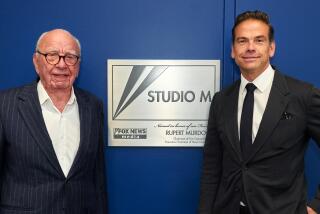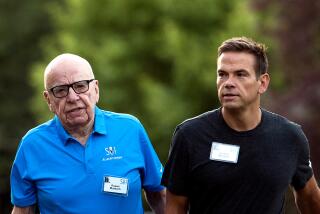Dole Food agrees to be taken private by Chairman David H. Murdock
- Share via
The Dole Food Co. agreed Monday to sell all its remaining shares to the company’s chairman and chief executive, David H. Murdock, taking the Westlake Village produce giant private in a sweetened deal valued at $1.2 billion.
The 90-year-old Los Angeles billionaire will pay $13.50 a share in cash for all the outstanding shares of common stock he doesn’t already hold. As of June, he and his family owned nearly 40% of Dole stock.
The agreement, months in the making, comes after Murdock made a $12-a-share proposal in June. The purchase is viewed as a strategy to give Dole room to right itself after years of lackluster earnings.
“As a private company, Dole will likely be able to innovate without as much concern over [Wall Street] earnings expectations, and this should help grow certain categories longer-term,” BB&T Capital Markets analyst Brett Hundley wrote in a note to investors Monday.
The transaction represents a 32% premium over the $10.20-a-share price at which the stock was trading just before the negotiations became public. On Monday, Dole shares rose 68 cents, or 5.3%, to $13.49.
The arrangement places the total enterprise value of Dole, plus debt, at $1.6 billion, according to the company. The firm’s board, minus Murdock, unanimously approved the deal, which now needs to be cleared by stockholders and regulators.
Murdock will fund the purchase with his own cash and equity, aided by financing from Deutsche Bank, Bank of America and the Bank of Nova Scotia.
Dole has the option of using a so-called “go-shop” period, in which it can spend 30 days weighing other offers.
Otherwise, the company is expected to close the deal in the fourth quarter, according to a company statement released Monday announcing the transaction.
Murdock, a self-made mogul who recently sold the Hawaiian island of Lanai to Oracle Corp. Chief Executive Larry Ellison, first took Dole private more than a decade ago before bringing it public in 2009. In that sale, the company raised about $450 million selling shares for $12.50 apiece. Dole officials had initially hoped to sell stock for $13 to $15.
The company has struggled in recent years with debt and volatility in the fresh fruit division. Scorching heat this year badly damaged strawberries in California, hurting the company’s berry sales. Dole expects earnings from its banana operations to also take a hit this year because of sinking prices.
Dole reported revenue of $4.2 billion last year, down 11% from 2011.
In an effort to get leaner and more profitable, Dole sold its global packaged foods and Asia fresh food businesses to Itochu Corp. of Japan in April for nearly $1.7 billion.
Murdock was also reinstated as Dole’s chief executive, a position he held from July 1985 to June 2007. He replaced David A. DeLorenzo, who joined Itochu to run the newly acquired Dole Asia Holdings.
In May, Dole suspended a $200-million share repurchase program to afford expansion of its fleet of container ships. Dole stock sank 16% in less than two weeks.
In a letter to the board in early June, Murdock acknowledged that efforts such as the deal with Itochu had done little to repair the company’s share value. He argued that Dole required significant long-term investment, some of which he warned would not generate returns soon.
“I believe that providing a premium to existing shareholders and operating Dole Food Co. as a private enterprise is the best alternative given the public-market focus on short-term earnings and predictable quarterly results,” Murdock wrote. “This will give the company greater flexibility to make investment and operating decisions based on long-term strategic goals without the concern that a public company must have for the investing public’s short-term expectations.”
Dole was founded in 1851 in Hawaii, a location that allowed it popularize pineapples in the U.S. Dole would grow into one of the world’s largest sellers of fresh fruits and vegetables as well as canned fruit and juice.
Murdock is known as a quirky billionaire obsessed with health. In 2006, he opened a 20-acre resort and health institute in Westlake Village and has been known to ban burgers in Dole’s corporate headquarters’ cafeteria.
Murdock never completed high school but rose to become one of America’s richest men, investing a great deal in real estate. He remains chairman, chief executive and president of Castle & Cooke Inc., a Los Angeles real estate and development company.
More to Read
Inside the business of entertainment
The Wide Shot brings you news, analysis and insights on everything from streaming wars to production — and what it all means for the future.
You may occasionally receive promotional content from the Los Angeles Times.












